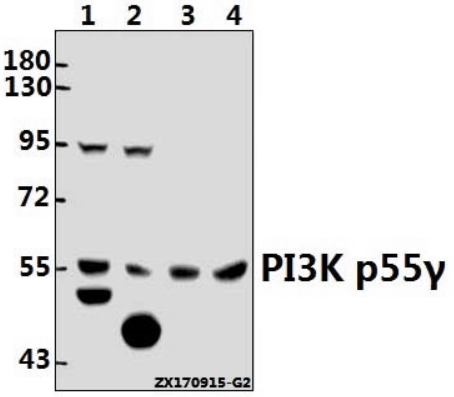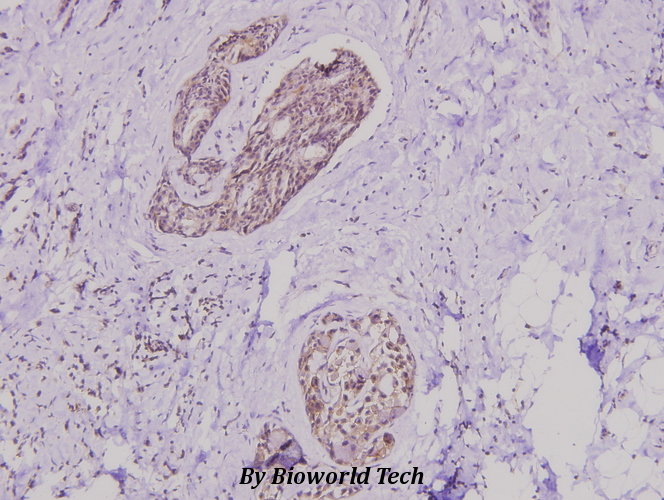Product Name :
PI3K p55γ (Y463) polyclonal antibody Background :
The enzyme phosphatidylinositol 3 kinase (PI3 kinase) is a lipid kinase that generates phosphatidylinositol 3, 4, 5-triphosphate in response to receptor activation in many signal transduction pathways. Class IA PI3Ks exist as a heterodimer of a catalytic 110 kDa (p110) and a regulatory p85 subunit (e.g. p85 alpha). p85 alpha is an adaptor molecule that regulates the activity of the catalytic p110 subunit by binding to phosphorylated receptor tyrosine kinases (RTKs) through its SH2 domain and mediating the interaction between p110 and the plasma membrane. p85 alpha is necessary for insulin-stimulated increase in glucose uptake and glycogen synthesis in insulin-sensitive tissues. Product :
Rabbit IgG, 1mg/ml in PBS with 0.02% sodium azide, 50% glycerol, pH7.2 Storage&Stability :
Store at 4°C short term. Aliquot and store at -20°C long term. Avoid freeze-thaw cycles. Specificity :
PI3K p55γ (Y463) polyclonal antibody detects endogenous levels of PI3-kinase p85α protein. This antibody also detects PI3K p55γ protein. Immunogen :
Synthetic peptide, corresponding to amino acids 430-480 of Human PI3K p85α. Conjugate :
Unconjugated Modification :
Unmodified
PI3K p55γ (Y463) polyclonal antibody Background :
The enzyme phosphatidylinositol 3 kinase (PI3 kinase) is a lipid kinase that generates phosphatidylinositol 3, 4, 5-triphosphate in response to receptor activation in many signal transduction pathways. Class IA PI3Ks exist as a heterodimer of a catalytic 110 kDa (p110) and a regulatory p85 subunit (e.g. p85 alpha). p85 alpha is an adaptor molecule that regulates the activity of the catalytic p110 subunit by binding to phosphorylated receptor tyrosine kinases (RTKs) through its SH2 domain and mediating the interaction between p110 and the plasma membrane. p85 alpha is necessary for insulin-stimulated increase in glucose uptake and glycogen synthesis in insulin-sensitive tissues. Product :
Rabbit IgG, 1mg/ml in PBS with 0.02% sodium azide, 50% glycerol, pH7.2 Storage&Stability :
Store at 4°C short term. Aliquot and store at -20°C long term. Avoid freeze-thaw cycles. Specificity :
PI3K p55γ (Y463) polyclonal antibody detects endogenous levels of PI3-kinase p85α protein. This antibody also detects PI3K p55γ protein. Immunogen :
Synthetic peptide, corresponding to amino acids 430-480 of Human PI3K p85α. Conjugate :
Unconjugated Modification :
Unmodified
-
 Western blot (WB) analysis of PI3K p85α/p55γ (Y463) pAb at 1:500 dilution Lane1:HCC827 whole cell lysate(40ug) Lane2:SGC7901 whole cell lysate(40ug) Lane3:The Brain tissue lysate of Mouse(40ug) Lane4:The Testis tissue lysate of Rat(40ug)
Western blot (WB) analysis of PI3K p85α/p55γ (Y463) pAb at 1:500 dilution Lane1:HCC827 whole cell lysate(40ug) Lane2:SGC7901 whole cell lysate(40ug) Lane3:The Brain tissue lysate of Mouse(40ug) Lane4:The Testis tissue lysate of Rat(40ug) -
 Immunohistochemistry (IHC) analyzes of PI3K p85 α/γ (Y463) pAb in paraffin-embedded human breast carcinoma tissue at 1:100.
Immunohistochemistry (IHC) analyzes of PI3K p85 α/γ (Y463) pAb in paraffin-embedded human breast carcinoma tissue at 1:100. -
 Immunohistochemistry (IHC) analyzes of PI3K p85 α/γ (Y463) pAb in paraffin-embedded human breast carcinoma tissue at 1:100.
Immunohistochemistry (IHC) analyzes of PI3K p85 α/γ (Y463) pAb in paraffin-embedded human breast carcinoma tissue at 1:100.
Up-regulated autophagy by endogenous HMGB1 promotes chemoresistance in leukemia cells.
PMCID: Pubmed No.:21864037
Madecassoside suppresses migration of fibroblasts from keloids: involvement of p38 kinase and PI3K signaling pathways
PMCID: Pubmed No.:22360962
Paeoniflorin Attenuates Lipopolysaccharide-Induced Permeability of Endothelial Cells: Involvements of F-Actin Expression and Phosphorylations of PI3K/Akt and PKC
PMCID: Pubmed No.:23053726
Wogonin reverses hypoxia resistance of human colon cancer HCT116 cells via downregulation of HIF-1α and glycolysis, by inhibiting PI3K/Akt signaling pathway.
PMCID: Pubmed No.:23761018
LFG-500 Inhibits the Invasion of Cancer Cells via Down-Regulation of PI3K/AKT/NF-κB Signaling Pathway
PMCID: Pubmed No.:24618693
Knockdown of sphingosine kinase 1 inhibits the migration and invasion of human rheumatoid arthritis fibroblast-like synoviocytes by down-regulating the PI3K/AKT activation and MMP-2/9 production in vitro
PMCID: Pubmed No.:24816639
CXCL12/CXCR4 axis confers adriamycin resistance to human chronic myelogenous leukemia and oroxylin A improves the sensitivity of K562/ADM cells
PMCID: Pubmed No.:24858801
Effect of Tenuifoliside A isolated from Polygala tenuifolia on the ERK and PI3K pathways in C6 glioma cells.
PMCID: Pubmed No.:24877714
Angiogenin interacts with ribonuclease inhibitor regulating PI3K/AKT/mTOR signaling pathway in bladder cancer cells
PMCID: Pubmed No.:25193113
Role of PDGFR-β/PI3K/AKT signaling pathway in PDGF-BB induced myocardial fibrosis in rats
PMCID: Pubmed No.:25628782
LW‐213 induces G2/M cell cycle arrest through AKT/GSK3β/β‐catenin signaling pathway in human breast cancer cells
PMCID: Pubmed No.:25945460
Angiogenin interacts with ribonuclease inhibitor regulating PI3K/AKT/mTOR signaling pathway in bladder cancer cells
PMCID: Pubmed No.:25193113
Knockdown of sphingosine kinase 1 inhibits the migration and invasion of human rheumatoid arthritis fibroblast-like synoviocytes by down-regulating the PI3K/AKT activation and MMP-2/9 production in vitro
PMCID: Pubmed No.:24816639
LFG-500 Inhibits the Invasion of Cancer Cells via Down-Regulation of PI3K/AKT/NF-κB Signaling Pathway
PMCID: Pubmed No.:24618693
DYT-40, a novel synthetic 2-styryl-5-nitroimidazole derivative, blocks malignant glioblastoma growth and invasion by inhibiting AEG-1 and NF-κB signaling pathways
PMCID: Pubmed No.:27251589
LW‐213 induces G2/M cell cycle arrest through AKT/GSK3β/β‐catenin signaling pathway in human breast cancer cells
PMCID: Pubmed No.:25945460
Discovery of novel 3-hydroxyandrosta-5,7-Diene-17-Carboxylic acid derivatives as anti-inflammatory bowel diseases (IBD) agents
PMCID: Pubmed No.:33933753
GPER-Induced ERK Signaling Decreases Cell Viability of Hepatocellular Carcinoma
PMCID: Pubmed No.:33767999
Membrane‐tethered Notch1 exhibits oncogenic property via activation of EGFR–PI3K–AKT pathway in oral squamous cell carcinoma
PMCID: Pubmed No.:30515785
Alhagi honey polysaccharides attenuate intestinal injury and immune suppression in cyclophosphamide-induced mice
PMCID: Pubmed No.:34128029
Alhagi honey polysaccharides attenuate intestinal injury and immune suppression in cyclophosphamide-induced mice
PMCID: Pubmed No.:34128029
ERα and/or ERβ activation ameliorates cognitive impairment, neurogenesis and apoptosis in type 2 diabetes mellitus mice
PMCID: Pubmed No.:30201537
Inhibition of Akt/mTOR/p70S6K Signaling Activity With Huangkui Capsule Alleviates the Early Glomerular Pathological Changes in Diabetic Nephropathy
PMCID: Pubmed No.:29881349
Neuroprotective effects of novel compound Tozan on cognition, neurogenesis and apoptosis in diabetes
PMCID: Pubmed No.:34734023
Activation of ERα and/or ERβ ameliorates cognitive impairment and apoptosis in streptozotocin-induced diabetic mice
PMCID: Pubmed No.:30096284
Ursolic acid induces apoptosis and anoikis in colorectal carcinoma RKO cells
PMCID: Pubmed No.:33549076
In vivo immunotoxicity of Gd2O3:Eu3+ nanoparticles and the associated molecular mechanism
PMCID: Pubmed No.:32659858
YAP mediates the interaction between the Hippo and PI3K/Akt pathways in mesangial cell proliferation in diabetic nephropathy
PMCID: Pubmed No.:32816106
Let-7b regulates the adriamycin resistance of chronic myelogenous leukemia by targeting AURKB in K562/ADM cells
PMCID: Pubmed No.:32856506
Paeoniflorin exerts neuroprotective effects by modulating the M1/M2 subset polarization of microglia/macrophages in the hippocampal CA1 region of vascular dementia rats via cannabinoid receptor 2
PMCID: Pubmed No.:29560022
The negative charge of the 343 site is essential for maintaining physiological functions of CXCR4
PMCID: Pubmed No.:33485325
Methyl Helicterate Inhibits Hepatic Stellate Cell Activation Through Modulation of Apoptosis and Autophagy
PMCID: Pubmed No.:30466104
Neuroprotective effects of novel compound FMDB on cognition, neurogenesis and apoptosis in APP/PS1 transgenic mouse model of Alzheimer's disease
PMCID: Pubmed No.:36893915
Bioworld Biotech only provide peptides for our antibodies and do not provide additional peptide customization services.
Price/Size :
USD 368/1mg/vial
Tips:
For phospho antibody, we provide phospho peptide(0.5mg) and non-phospho peptide(0.5mg).Describe :
Blocking peptides are peptides that bind specifically to the target antibody and block antibody binding. These peptide usually contains the epitope recognized by the antibody. Antibodies bound to the blocking peptide no longer bind to the epitope on the target protein. This mechanism is useful when non-specific binding is an issue, for example, in Western blotting (WB) and Immunohistochemistry (IHC). By comparing the staining from the blocked antibody versus the antibody alone, one can see which staining is specific; Specific binding will be absent from the western blot or IHC performed with the neutralized antibody.Formula:
Synthetic peptide was lyophilized with 100% acetonitrile and is supplied as a powder. Reconstitute with 0.1 ml DI water for a final concentration of 10 mg/ml.The purity is >90%,tested by HPLC and MS.
Storage:
The freeze-dried powder is more stable. For short time at 2-8°C. For long term storage store at -20°C.
Note :
This product is for research use only (RUO only). Not for use in diagnostic or therapeutic procedures.
 PI3K p55γ (Y463) polyclonal antibody
PI3K p55γ (Y463) polyclonal antibody  Datasheet
Datasheet COA
COA MSDS
MSDS SHIP
SHIP